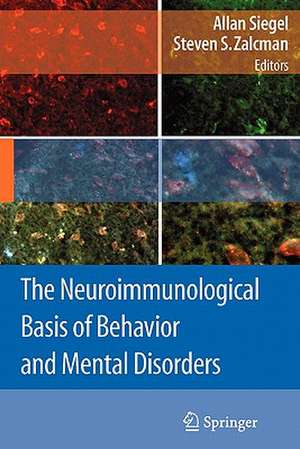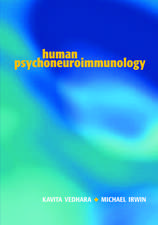The Neuroimmunological Basis of Behavior and Mental Disorders
Editat de Allan Siegel, Steven S. Zalcmanen Limba Engleză Paperback – 3 noi 2010
| Toate formatele și edițiile | Preț | Express |
|---|---|---|
| Paperback (1) | 945.06 lei 6-8 săpt. | |
| Springer Us – 3 noi 2010 | 945.06 lei 6-8 săpt. | |
| Hardback (1) | 950.57 lei 6-8 săpt. | |
| Springer Us – 13 noi 2008 | 950.57 lei 6-8 săpt. |
Preț: 945.06 lei
Preț vechi: 1152.52 lei
-18% Nou
Puncte Express: 1418
Preț estimativ în valută:
180.100€ • 186.48$ • 151.62£
180.100€ • 186.48$ • 151.62£
Carte tipărită la comandă
Livrare economică 24 februarie-10 martie
Preluare comenzi: 021 569.72.76
Specificații
ISBN-13: 9781441946577
ISBN-10: 1441946578
Pagini: 456
Ilustrații: XV, 438 p.
Dimensiuni: 155 x 235 x 24 mm
Greutate: 0.64 kg
Ediția:Softcover reprint of hardcover 1st ed. 2009
Editura: Springer Us
Colecția Springer
Locul publicării:New York, NY, United States
ISBN-10: 1441946578
Pagini: 456
Ilustrații: XV, 438 p.
Dimensiuni: 155 x 235 x 24 mm
Greutate: 0.64 kg
Ediția:Softcover reprint of hardcover 1st ed. 2009
Editura: Springer Us
Colecția Springer
Locul publicării:New York, NY, United States
Public țintă
Professional/practitionerDescriere
For many years, the immune and central nervous systems were thought to function independently with little or no interaction between the two. This view has und- gone dramatic changes over the past three decades. Indeed, we now know that there exists various feedback loops between the brain and immune systems that impact signi cantly upon different behavioral processes, including normal behavior and mental disorders. Pioneering efforts in generating this change were initiated by a number of early investigators. Included were those whose efforts were directed at establishing neuroimmune connections as well as others whose research focused upon the relationship between immunity, cytokines, and behavior. This book brings together outstanding scientists and clinicians who have made major contributions to the rapidly developing eld investigating the relationship between immunity and behavior. The book is divided into three parts. The rst part describes pathways by which the brain and immune systems communicate and int- act with each other. In the chapter “Cytokines and the Blood–Brain Barrier” p- vides insight into interactions between the blood–brain barrier and cytokines. Such interactions underlie basic communication between the immune system and brain that are present in normal as well as in disease conditions. In the chapter “Neu- chemical and Endocrine Responses to Immune Activation: The Role of Cytokines,” the neurochemical and endocrine consequences of immune challenge and cytokine administration on central neurotransmitter activity are discussed.
Cuprins
Neuroimmune Interactions.- Cytokines and the Blood–Brain Barrier.- Neurochemical and Endocrine Responses to Immune Activation: the Role of Cytokines.- Neural Pathways Mediating Behavioral Changes Associated with Immunological Challenge.- Molecular Basis of Cytokine Function.- Interferon-?, Molecular Signaling Pathways and Behavior.- Exercise and Stress Resistance: Neural-Immune Mechanisms.- Neuroimmunological Basis of Behavior.- Alteration of Neurodevelopment and behavior by Maternal Immune Activation.- Interleukin-2 and Septohippocampal Neurons: Neurodevelopment and Autoimmunity.- Cytokine-Induced Sickness Behavior and Depression.- Effect of Systemic Challenge with Bacterial Toxins on Behaviors Relevant to Mood, Anxiety and Cognition.- Cytokines, Immunity and Sleep.- Cytokines and Aggressive Behavior.- Neurochemical and Behavioral Changes Induced by Interleukin-2 and Soluble Interleukin-2 Receptors.- Neuroimmunological Basis of Mental Disorders.- Immunity and Depression: A Clinical Perspective.- Cytokines, Immunity and Schizophrenia with Emphasis on Underlying Neurochemical Mechanisms.- Immunobiological and Neural Substrates of Cancer-Related Neurocognitive Deficits.- Autoimmunity and Brain Dysfunction.- Viruses and Psychiatric Disorders.- Microglial Cells and Inflammatory Cytokines in the Aged Brain.
Notă biografică
Allan Siegel, Ph.D., was awarded his doctorate from the State University of New York at Buffalo in 1966 and was trained in the fields of Neurophysiology, Neuroanatomy and Behavioral Neuroscience at Yale University School of Medicine. He is Professor of Neurology and Neuroscience and Psychiatry at New Jersey Medical School's University of Medicine and Dentistry in Newark, New Jersey. His research focuses on the anatomical substrates and neurochemical mechanisms, including the functions of cytokines, governing aggression, and rage behavior.
Steven S. Zalcman, Ph.D. was awarded his doctorate from Carleton University, Ottawa, Canada in 1990, and was a postdoctoral fellow at the Manitoba Institute of Cell Biology, University of Manitoba Medical School. He received training in Behavioral Neuroscience, Neurochemistry, Anatomy, and Immunology. He held a faculty position in the Department of Psychology, Concordia University, Montreal, Canada, and is presently Associate Professor of Psychiatry at New Jersey Medical School's University of Medicine and Dentistry in Newark, New Jersey. His research focuses on neurochemical, neuropharmacological, and behavioral consequences of immune activation and cytokine treatment.
Steven S. Zalcman, Ph.D. was awarded his doctorate from Carleton University, Ottawa, Canada in 1990, and was a postdoctoral fellow at the Manitoba Institute of Cell Biology, University of Manitoba Medical School. He received training in Behavioral Neuroscience, Neurochemistry, Anatomy, and Immunology. He held a faculty position in the Department of Psychology, Concordia University, Montreal, Canada, and is presently Associate Professor of Psychiatry at New Jersey Medical School's University of Medicine and Dentistry in Newark, New Jersey. His research focuses on neurochemical, neuropharmacological, and behavioral consequences of immune activation and cytokine treatment.
Textul de pe ultima copertă
Over the past three decades, the neuroscience community has seen the rapid growth of neuroimmunology, a new area of research investigating how immune activation and immune-derived products interact with the brain and modulate behavior. A convergence of multidisciplinary investigators helped launch this field by developing several groundbreaking lines of research, including the characterization of neuroimmune feedback loops, development of an understanding of sickness behavior, the role of cytokines in modulating normal and abnormal neurochemical and behavioral functions, clinical studies linking mental disorders with alterations in immune function, and identification of the molecular substrates governing the neuroimmunological basis of behavior and mental disorders. The Neuroimmunological Basis of Behavior and Mental Disorders includes contributions from outstanding scientists, and clinicians who have made major contributions to one or more of the subsets of this rapidly developing field. This book will be of particular interest and use to scientists, clinicians, students, educators, and workers in the field of neuroscience and related disciplines involving the study of normal and abnormal behavior.
About the Editors:
Allan Siegel, Ph.D., was awarded his doctorate from the State University of New York at Buffalo in 1966 and was trained in the fields of Neurophysiology, Neuroanatomy and Behavioral Neuroscience at Yale University School of Medicine. He is Professor of Neurology and Neuroscience and Psychiatry at New Jersey Medical School's University of Medicine and Dentistry in Newark, New Jersey. His research focuses on the anatomical substrates and neurochemical mechanisms, including the functions of cytokines, governing aggression, and rage behavior.
Steven S. Zalcman, Ph.D., was awarded his doctorate from Carleton University, Ottawa, Canada in 1990, and was a postdoctoral fellow at the Manitoba Institute of Cell Biology, University of Manitoba Medical School. He received training in Behavioral Neuroscience, Neurochemistry, Anatomy, and Immunology. He held a faculty position in the Department of Psychology, Concordia University, Montreal, Canada, and is presently Associate Professor of Psychiatry at New Jersey Medical School's University of Medicine and Dentistry in Newark, New Jersey. His research focuses on neurochemical, neuropharmacological, and behavioral consequences of immune activation and cytokine treatment.
About the Editors:
Allan Siegel, Ph.D., was awarded his doctorate from the State University of New York at Buffalo in 1966 and was trained in the fields of Neurophysiology, Neuroanatomy and Behavioral Neuroscience at Yale University School of Medicine. He is Professor of Neurology and Neuroscience and Psychiatry at New Jersey Medical School's University of Medicine and Dentistry in Newark, New Jersey. His research focuses on the anatomical substrates and neurochemical mechanisms, including the functions of cytokines, governing aggression, and rage behavior.
Steven S. Zalcman, Ph.D., was awarded his doctorate from Carleton University, Ottawa, Canada in 1990, and was a postdoctoral fellow at the Manitoba Institute of Cell Biology, University of Manitoba Medical School. He received training in Behavioral Neuroscience, Neurochemistry, Anatomy, and Immunology. He held a faculty position in the Department of Psychology, Concordia University, Montreal, Canada, and is presently Associate Professor of Psychiatry at New Jersey Medical School's University of Medicine and Dentistry in Newark, New Jersey. His research focuses on neurochemical, neuropharmacological, and behavioral consequences of immune activation and cytokine treatment.
Caracteristici
Focuses on immune effects upon adaptive behavior
Provides analysis of immune relationships to abnormal behavior
Presents the integration of clinical and experimental neuroimmune studies
Includes supplementary material: sn.pub/extras
Provides analysis of immune relationships to abnormal behavior
Presents the integration of clinical and experimental neuroimmune studies
Includes supplementary material: sn.pub/extras











